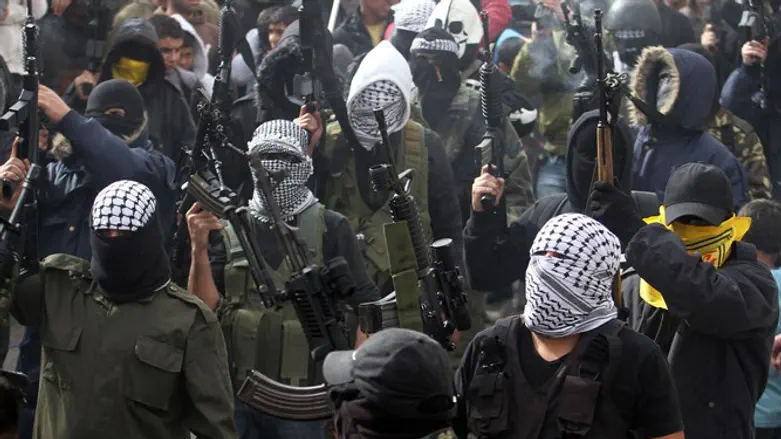
Which of the following actions by "ideologically-motivated" Palestinian Arabs should be considered terrorism?
(A) Placing a bomb at a bus stop in downtown Tel Aviv, killing an Israeli teenage girl.
(B) Kidnapping an Israeli teenage boy and shooting him point-blank in the head.
(C) Throwing flaming bottles of gasoline at Israelis, in order to burn them alive.
(D) Firing automatic weapons at Israeli civilian buses.
The answer, according to the New York Times and the Washington Post, is “(E) None of the above.”
The terrorist attacks listed above were just a small sample of the violent crimes against civilians committed by the six Palestinian Arabs who recently escaped from an Israeli prison. Yet in the coverage of the escape by America’s two most prominent and influential newspapers, the word “terrorist” never appears.
According to articles by the New York Times’s Jerusalem bureau chief, Patrick Kingsley, the murderers are “prisoners,” “militants,” or simply “the six men.” Kingsley’s computer keyboard appears to be incapable of producing the word “terrorist” when Palestinian Arabs are involved. Maybe the tech support folks at the Times should have a look at his laptop. Clearly something is malfunctioning when no act of Palestinian Arab violence, no matter how heinous, is considered terrorism.
Even when Kingsley gets around to describing the crimes they committed, he cannot bring himself to admit that it was “terrorism.” The six were “convicted or accused of militant activity,” he writes. No, they weren’t. The Israeli prosecutors’ bills of indictment did not use euphemisms such as “militant activity” to cover up the nature of the crimes, as Kingsley does. They were indicted for terrorism and murder.
What about the terrorist groups to which the six belong? Kingsley of the Times re-brands them, too. Five are members of Islamic Jihad, the terrorist gang that has murdered hundreds of Jews, including my daughter, Alisa, in 1995. Kingsley labels them simply “a militant group.”
The sixth escaped terrorist was a leader of—here’s how the Times puts it—“the Aqsa Martyrs Brigades, an armed group loosely linked to Fatah, the secular political party that dominates Palestinian institutions in the West Bank.”
What’s all this gobbledygook about being “loosely” linked to Fatah? Why do Kingsley and the Times come up with these kinds of verbal gymnastics, instead of acknowledging the indisputable fact that the Al-Aqsa Martyrs’ Brigade is part and parcel of Fatah?
Because Fatah is chaired by Palestinian Authority leader Mahmoud Abbas. Acknowledging that Fatah sponsors terrorism would force the Biden administration to end all relations with the PA. So, the PA and its sympathizers play a game in which they pretend that Fatah doesn’t really control the Al-Aqsa terrorists.
If you doubt that the Al-Aqsa Martyrs Brigades are really part of Fatah, don’t take my word for it. Consider what sources that are not friendly to Israel have to say on the subject.
The official BBC News profile of the Brigades states: “The al-Aqsa Martyrs' Brigades is an armed Palestinian group associated with Yasser Arafat's Fatah organisation.” Perhaps the BBC has no choice but to admit the truth, because it was its own team of journalists which in November 2003 uncovered the fact that Fatah was paying $50,000 monthly to the Brigades.
National Public Radio has described it as “Fatah’s armed militant wing, the Al-Aqsa Martyrs’ Brigades.” A Council on Foreign Relations report on the Brigades found that they are “aligned with Fatah” and “affiliated with former Palestinian leader Yasir Arafat’s Fatah faction.”
A June 2005 study by the U.S. government’s own Congressional Research Service reported: “On December 18, 2003, Fatah asked the leaders of the al-Aqsa Martyrs Brigades to join the Fatah Council, recognizing it officially as part of the Fatah organization.”
How about the Palestinian Authority itself? What do PA leaders say about the Al-Aqsa gang? In June 2004, then-PA Prime Minister Ahmed Qurei openly declared in an interview with the London-based Asharq al-Awsat newspaper: “We have clearly declared that the Aksa Martyrs' Brigades are part of Fatah. We are committed to them, and Fatah bears full responsibility for the group." (Jerusalem Post, June 20, 2004)
The New York Times’ coverage of the escaped terrorists has been bad enough—but the way the Washington Post has handled the story has been even worse.
Post correspondent Ellen Francis called them “prisoners” and “fugitives”—not even “militants,” much less “terrorists.” In her reporting, Islamic Jihad is not even “a militant group” (as the Times calls it)—it’s just “the Islamic Jihad movement.” And Fatah is not even mentioned by Francis—it’s merely “the al-Aqsa Martyrs Brigades.” Readers of the Post were not given the slightest indication as to what those two groups are all about.
Earlier this summer, a poll by the Reuters Institute for the Study of Journalism, at Oxford, found that just 29% of Americans trust the news media. The United States placed dead last, out of 46 countries surveyed, in media trust.
Perhaps the blatant attempts by America’s two most influential newspapers to cover up the nature of Palestinian Arab terrorism might help explain why so many people distrust the media.
Stephen M. Flatow, an attorney in New Jersey and the father of Alisa Flatow, who was murdered in an Iranian-sponsored Palestinian terrorist attack in 1995. He is an oleh chadash and the author of “A Father’s Story: My Fight for Justice Against Iranian Terror.”
